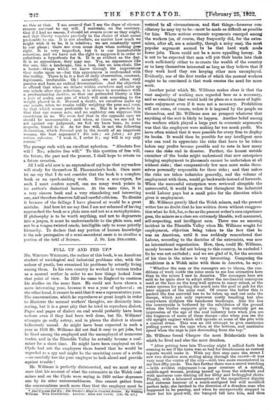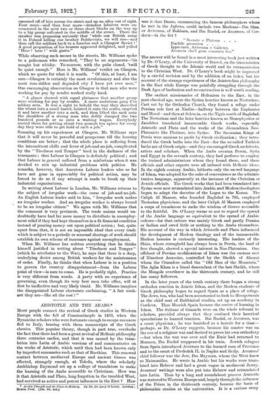_FULL UP AND FRD UP.*
Mt. WRITTNG WII.T.TAMS, the author of this book, is an American student of sociological and industrial -problems who, with the ardour of youth, has examined his problems by actually -living among them. In -his own country he worked in -various trades as a manual worker in order to see how things looked 'from that point of view. In 1920 he came to England-to continue 'his studies on the same lines. He could -not -have chosen a more interesting year, -because it was a year Of upheaval.; on the other hand, it cannot be said that it-was-a representative year. The conversations, whieh he reproduces- at' great length in order to illustrate the manual workers' thoughts, are distinctly inte- resting, but it is a great pity that he tried to reproduce .dialect. -Pages and .pages of dialect .on -end would :probably have been tedious even if they had -been well done, but Mr. Williems' attempts go sadly astray, and in places the dialect is almost ludicrously unreal. As might have been expected :in such a year as 1920 Ma Williams did -not find it easy to get 'jobs, ;but he lived among the employed and the unemployed of numerous trades, and in-the Rhondda Valley he actually became a coal- -miner for a short time. He might have been employed on the Clyde had not the employers there feared that he -would be 'regarded as a spy and might be the unwitting cause of a strike —so carefully has the poor employer to look-ahead -and provide (against trouble !
Mr. Williams is perfectly -disinterested, and we mutt say at .once that his account of what the extremists in the Welsh coal- mines -and on the Clyde were saying in -1920 rather -depresses -one by its utter -unreasonableness. One -canna gather from the conversations much more than-that the employer must be • illilltUganakFed Up: .19w=iVorker's Mad in Orotatsd-Britaa g. 'By Whiting Villiams. With Illustrations. London : Allen and Unwin, [12s. Od. net.] resisted 'in -all circumetances, and that things—however con- eiliatery he may tryto be—muet'be made as difficult as possible 'for him. Where -serious economic -arguments emerged among `the workers las, df course, they frequently did, for the extre- mists, after all, are 'a minority, -though a noisy one), the most popular argument seemed to be that hard wprk made fewer jobs. There could not be a more appalling heresy. It 'is not to 'be-expected that men will put their backs into their work sufficiently either to re-create the wealth of the country -or to keep•thernselves interested so long as they believe that if they work hard they are keeping other men unemployed.
Evidently, one of the first truths of which the manual workers ought to be -convinced is that work creates the need for more mark.
Another point -whiCh Mr. Williams makes Clear is that the vast majority of working men regarded beer as a necessary,
and as somethingthat would hold' ita plaee-as a means of legiti- mate 'enjoyment even if it were not a necessary. Prohibition will not come, of course, unless it 18 imposed by the people on themselves, and Mr. Williams sees no prospect whatever that anything oft-he sort is likely to happen. Another belief among the workers which played a large part in economic arguments was that the employers were making far too much -profit. We have often wished that it were possible for-every-firm to display Its -books. It would then be possible for any intelligent man who can read le appreciate the risks that have to be taken before any profits -become possible and to note -in how many cases the risks end in disaster. Further, -the honest outside examiner 'of the books might understand that new enterprises bringing employment to Amman& cannot be -undertaken at all without aiske ; that comparatively few men -must make them- selves personally 'responeible for these risks ; and that unless the risks are taken industries generally, and the volume of employment with them, wouldgo backwards instead of forwards. When the - successful enterprises were reviewed alongside the ansuccessful, it would be seen that throughout the industrial world Labour pays but a small price for the direction which
gives it employment.
Mr. Williams greatly liked the Welsh miners, and-the-present writer has no doubt that he has written down without exaggera- tion-what he feltaf or, so far as the present writer's own experience
goes, the miners as a class are extremely likeable, well-mannered, self-respecting, and Intelligent men. There was an amusing incident in the Rhondda Valley when Mr. Williams sought for employment, -objection being 'taken to the fact that he was an American, until it was suddenly remembered that Labour, according to' the doctrine of the 'extremists, was now an international organization. How, then, could Mr. Williams, merely because he did not belong to this country, be excluded ? So he was not exoluded ; and we are glad of it, for the account of his time in the mines is very interesting. Comparing the
conditions in a :Welsh mine with those in America, -he says : " Whether -the men or the managers are to blame, the con- ditions of work inside the mine seem to me less attractive here than 'in the mines 7I .saw in America. The managers here are said to be quite slow to adopt either the mechanical conveyors used at the face on the long-wall system in 'many-mina, or the water system for packing the muck into the goaf or gob for the later support of the mine roof. Of course the better this is packed the less material has to be taken up and out onto the dumps, which not only represent -costly handling but also everywhere disfigure the handsome landscape. Also the less the countryside is -bothered by the subsidence of the ground When the timber supports give way. You certainly get an impression of the age of the coal industry here when you see the hugeness of some of these dumps—also when you see the old upright- engines which still operate at some of the pits with a conical drum. This was an old attempt to .give maximum pulling power on the cage when at the bottom, and maximim speed when'the cage is just descending from the top."
Mr. Williams 'found .Glasgow the most -Bolshevistic town in whieh 'lived and also the most drunken.
"After getting here late Thursday night I sallied forth lad evening-to see if the town was as bad-for-drunkenness as current reports -would -make it. With my first step onto the street I saw two drunken men reeling along through the crowd—it was very near the centre af the city—with two more encountered in my first fifty yards. Ten feet farther there was a crowd watching —with evident enjoyment poor creature of a sottish, middle-aged woman, picking herself up from the sidewalk and with unctuous care dusting off her filthy and bedraggled skirts. Finally, with a laboured assumption of the magnificent dignity and extreme hauteur of a much-maligned but still unsullied perfect lady, ishe lurched in the direction of a drunken man who happened to be passing, and when he unexpectedly stopped to show her his -good-will, She humped full into him, and then caromed off of him across the street.and up-au alley out of sight. Four more—ond1 then foun more—drunken laborers were en- countered in the next two or three short, blocks on the way up to a big group-colleoted. in. the-middle of the-street. There the speaker was, proposing, seriously that 'while our British army is in. Poland- killing our! brother Bolshevists, we will rise and then call, the soldiera backla &London and a Glasgow Soviet ! ' it good proportion. of-his hearers appeared delighted, and yelled ' Hear ! hear ! ' with gusto."
While observing sucli scenes in the streets, Mn Williams spoke to a policeman who remarked, "They be no arguments—'tis nought but whisky. To-morrow, with the pubs closed, 'twill be quiet enough." Here is Mr. Williams' verdict on Glasgow, which we quote for what it is worth. "Of this, at least, I am sure—Glasgow is certainly the most revolutionary and also the most rum-ridden and degraded city I have yet ever seen."
One encouraging observation on Glasgow is that men who were working for pay by results worked really hard.
"A glance showed with equal plainness that another group were working for pay by results. A more ambitious gang I've seldom seen. It was a sight to behold the way they shovelled the wheat into a small barrel, hoisted it onto the scales emptied it and later another into a sack, and then lifted the :tack onto the shoulders of a strong man who deftly dumped the two hundred pounds or so onto a waiting wagon. Everybody envied them for getting about two pounds ten apiece for every day they were able to get hold of such a job."
Summing up his experiences at Glasgow, Mr. Williams says that it will never be peaceful and prosperous till the housing conditions are better ; that the whole place is suffering from the intermittent chills and fever of job-and-no-job, complicated by the "Tiredness and Temper" bred in the darkness of the
tenements ; that Labour in Glasgow is definitely political'; and that Labour in general suffered from a misfortune when it was decided to mix up industrial problems with politics. He remarks, however, that American Labour leaders who so far have not gone in appreciably f or political action, may be forced to do so if any attempt is made to break up their industrial organisations.
In writing about Labour in London, Mr. Williams returns to the subject of irregular work—the curse of job-and-no-job. An English Labour leader said to him, "Irregular work makes an irregular worker. And an irregular worker is always bound to be an irregular citizen." We agree with Mr. Williams that the comment is very pertinent. The trade unions would un- doubtedly have had far more money to distribute in unemploy- ment relief if they had kept themselves in a fit financial condition instead of pouring money out upon political action ; but, quite apart from that, it is not an impossible ideal that every trade which is subject to a periodic or seasonal shortage of work should establish its own scheme of insurance against unemployment.
When Mr. Williams has written everything that he thinks himself justified in writing about "Tiredness and Temper" (which he attributes to the War), he says that there is a deep, underlying desire among British workers for the maintenance of order. Finally, he thinks that when Labour is in a position to govern the country disappointment—from the Labour point of view—is sure to come. He is probably right. Practice is very different from words. A party with no experience of governing, even though its very best men take office, will at first be ineffective and very likely timid. Mr. Williams imagines the disappointed Labour electorate exclaiming, "A fair wash- out they are—like all the rest ! "



































 Previous page
Previous page